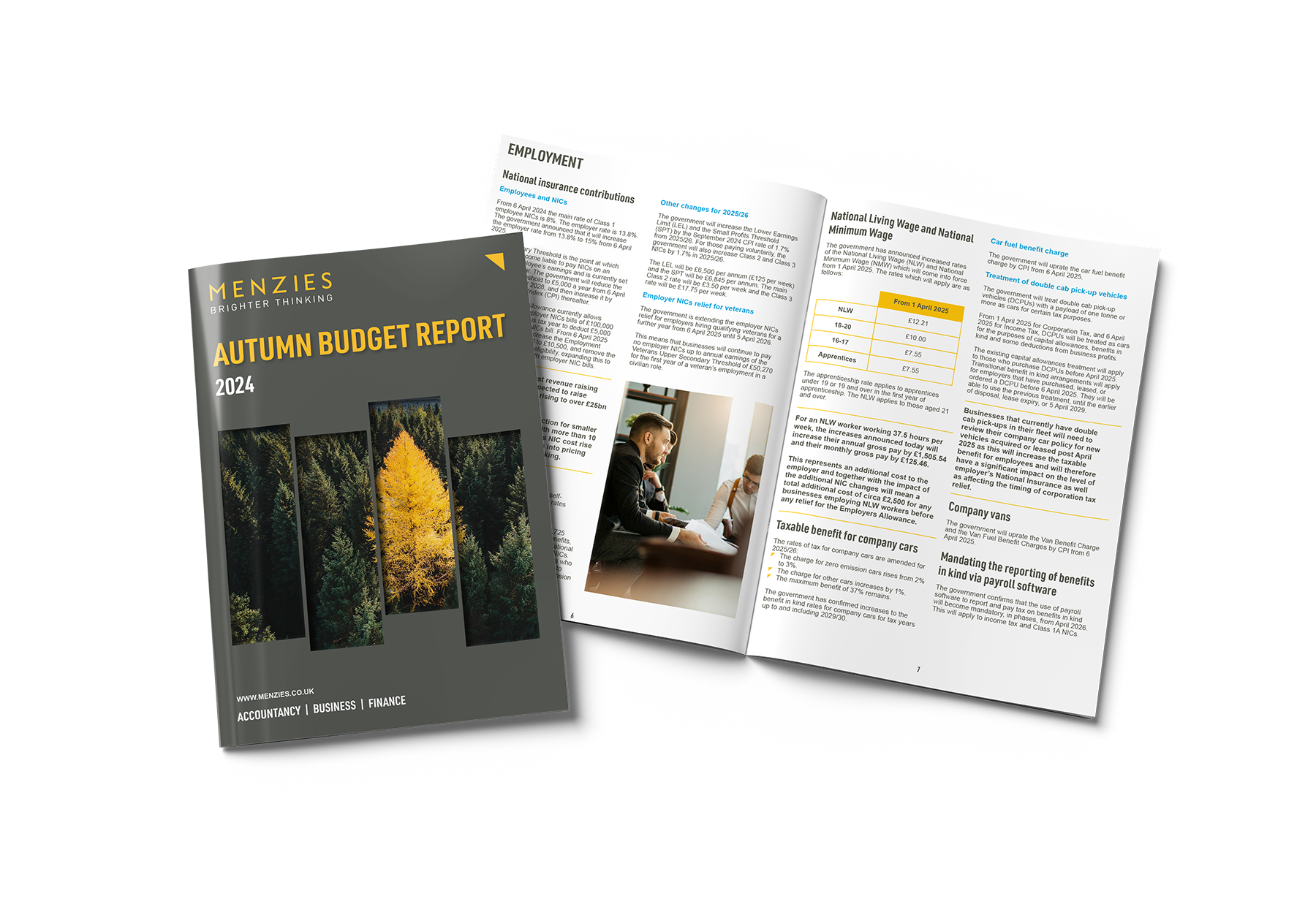The Autumn Budget summarised a plan to revitalise Britain by imposing additional taxes and employment costs on businesses. This approach could threaten the stability of small and medium-sized enterprises, which are crucial to the economy. While adjustments to thresholds and business rates may be received positively, the decision to raise National Insurance contributions for employers by 1.2% and lower the threshold for contributions directly impacts businesses’ capacity to invest in their employees and future growth. Furthermore, increases in the national living wage could limit businesses’ ability to expand their workforces and offer future pay raises.

Autumn Budget Report 2024
Download your copyAutumn Budget Commentary: General and Sector-Specific
General Commentary
Increase to Employer National Insurance contributions
Today the Chancellor increased employer National Insurance contributions by 1.2% to 15%, and lowered the threshold for when employers begin to pay National Insurance contributions from £9,100 per year to £5,000 per year.
Andrew Brookes, Head of Employment Tax Solutions, comments:
“Today’s increase in employer National Insurance contributions to 15%, coupled with a reduction in the contribution threshold from £9,100 to £5,000, delivers a significant blow to businesses’ capacity to invest in their people and long-term growth.
While the Government has made efforts to offset the impact on smaller businesses through an enhanced employment allowance, meaning 65,000 businesses will be exempt from National Insurance contributions altogether next year, the new policy still places added financial strain on larger employers. For many, these higher costs could impact hiring decisions, training programs, and broader investments in workforce development, at a time when sustained investment in talent is crucial for economic stability and growth.”
Business Asset Disposal Relief
The rate for Business Asset Disposal Relief, formerly known as Entrepreneurs’ Relief, will increase to 14% from 6 April 2025, and will increase again to match the lower main rate of Capital Gains Tax at 18% from 6 April 2026.
Richard Godmon, Head of Tax services, comments:
“For those under Business Asset Disposal Relief, this change will almost double the current rate of Capital Gains Tax for individuals disposing of business assets, which could have profound implications for entrepreneurs and investors.
For many business owners, the relief has provided a huge incentive to reinvest in their businesses or plan for retirement. This increase could cause a real slowdown in business disposals as owners weigh the higher costs against potential gains. This may impact market liquidity and limit opportunities for new investors looking to acquire established businesses. While the Government aims to boost revenue through these adjustments, it is vital to ensure that the tax regime continues to support business growth and encourages entrepreneurial activity in the long run.”
Plastic Packaging Tax Rate
Emma McCartney, Director, Business Tax comments:
Plastic Packaging Tax Rate Change
“The Chancellor announced in the Budget that the rate of Plastic Packaging Tax (PPT) will increase in line with the Consumer Price Index (CPI). The new rate of PPT will be £223.69 per tonne and will apply to plastic packaging containing less than 30% recycled plastic that is manufactured and imported into the UK from 1 April 2025. The rate has been updated on GOV.UK.“
Plastic Packaging Tax: Mass Balance Approach Consultation Update
“Alongside the Budget, the Government Response to the consultation on: ‘Plastic Packaging Tax – chemical recycling and adoption of a mass balance approach’ has been published. “
“The consultation sought views on allowing a mass balance approach (MBA), the different mass balance models, and the use of certification schemes to track recycled plastic through the plastics value chain. It also considered the exemption from PPT for the immediate packaging of human medicines if a MBA is permitted, and the treatment of pre-consumer waste as recycled plastic for the purpose of the tax.“
Government Response:
“The Government Response confirms a MBA will be allowed to account for chemically recycled plastic for the purposes of PPT from a future date to be determined. It also confirms that at the same time the changes for MBA are introduced, pre-consumer waste will no longer be classified as recycled plastic for the purpose of PPT, closing a loophole that gives some businesses an unfair competitive advantage. The exemption for the immediate packaging of licensed human medicines will remain in place for the foreseeable future.“
VAT on school fees FAQ
Following Labour’s election win, they have gone ahead with their intention to impose VAT on education provided outside of the state sector. The current intention is that VAT will be imposed with effect from 1 January 2025.
Increases to Capital Gains Tax
The Budget increases the lower rate of Capital Gains Tax (CGT) from 10% to 18% and the higher rate from 20% to 24%.
Craig Hughes, Head of Private Client Tax Services, comments:
“Many will likely feel relieved that the increase for non-residential assets is a modest rise at the top end from 20% to 24%, rather than the more significant hikes that were initially anticipated.
However, the immediate implementation will have a tangible impact on taxpayers currently engaged in asset transactions. “Had these changes been deferred until the new tax year, as is often the case with Budget adjustments, it’s likely we would have seen a surge in asset sales as taxpayers moved to lock in gains at the lower rate. This would have provided a short-term revenue boost for the Treasury and allowed taxpayers time to adjust.
Conversely, the insistence on an immediate increase may have the unintended consequence of dampening market activity, as taxpayers hold onto their assets rather than incur a higher tax liability. This could limit the Treasury’s opportunity to capitalise on potential sales in the short term.”
Inheritance Tax changes
The current inheritance tax thresholds are due to be frozen until April 2028, and the Government is extending these threshold freezes for a further two years to April 2030. Agricultural property relief and business property relief will also be reformed from April 2026, with the rate of relief cut to 50% after the first £1 million of combined agricultural and business assets. The government will also reduce the rate of business property relief to 50% in all circumstances for shares designated as “not listed” on the markets of a recognised stock exchange, such as AIM.
The government is also bringing unspent pension pots into the scope of inheritance tax from April 2027.
Craig Hughes, Head of Private Client Tax Services, comments:
“Today’s announcement on Inheritance Tax (IHT) introduces additional layers of complexity without providing comprehensive reform. Freezing IHT thresholds until 2030, combined with adjustments to agricultural and business property reliefs, represents a substantial shift that will impact family-run businesses and farms particularly hard.
These changes are a heavy blow , especially for those with unlisted or agricultural assets, and could deter long-term investment in family businesses. A simplified and modernised IHT framework, rather than incremental adjustments, would be more effective in supporting intergenerational planning and economic growth.”
Abolition of non-dom tax status
The Chancellor confirmed she would fulfil the promise made in Labour’s manifesto to remove the non-domicile tax status and announced a move towards a residence-based regime.
Craig Hughes, Head of Private Client Tax Services, comments:
“While the abolition of non-domicile status in favour of a residence-based tax regime may be well-received in the current economic climate, this shift raises concerns for those who have long contributed to the UK economy through investment and spending. Many non-doms are active investors in UK businesses and property, and the rapid implementation of this change will introduce uncertainty, especially for those with complex overseas interests who may now face significantly higher tax liabilities. While this might offer a short-term boost to the Treasury, the long-term effects could be counterproductive, as some may or indeed will, choose to relocate elsewhere.
This change comes at a time when UK firms, especially in the City, are competing fiercely for global talent, and non-dom tax status has traditionally been a powerful incentive for skilled individuals to work in the UK. It’s imperative that the Government strikes the right balance between fair taxation and policies that support the UK’s appeal to international investors and individuals to prevent potential economic repercussions down the line.”
Investments in HMRC
Today’s Budget announced a significant expansion of HMRC, including the recruitment of 5,000 new officers and 1,800 debt management officers, signalling a tougher approach to tax debt collection. To support these efforts, there will also be substantial investment in IT to enhance HMRC’s ability to identify unreported taxpayers, referred to as “tax ghosts.”
Matt Watkins, Tax Disputes & Disclosures Director, comments:
“The announcement of 5,000 new HMRC officers and 1,800 debt management officers, with an investment of £1.4 billion over the next five years, marks a significant step in enhancing the UK’s tax compliance. However, it will be some time before the true impact of these new recruits materialises. The training process for compliance officers can span several years, which means that the increased enquiry work may not be fully realised until these officers gain the experience they need.
In the meantime, the emphasis on IT investment to streamline processes and target high-risk sectors may provide HMRC with more short-term wins. The use of technology to identify ‘tax ghosts’ will complement the increased enquiry activity, enhancing HMRC’s ability to uncover previously unreported liabilities.”
Listen to our Autumn Budget 2024 Podcast
Sector Commentary
Financial Services
Carried Interest
Carried interest is a form of performance-based reward for fund management executives, typically structured as a share of the profits generated by an investment fund managed by those investment managers. For private equity and venture capital funds, these profits are primarily derived from capital gains arising on realisation of the underlying assets held by those funds and is taxed at a higher rate of CGT but lower than the highest income tax rates.
Sarah Hallam, Partner, Financial Services Team comments:
“The Chancellor announced in the Autumn Budget that there is a compelling case to reform the tax regime for carried interest. From April 2026, carried interest will be taxed fully within the Income Tax framework, with bespoke rules to reflect its unique characteristics – providing for fairer and more sustainable outcomes, while safeguarding the strength of the UK as a fund management hub. Ahead of this, the CGT rates currently applied to carried interest will be increased from 28% to 32% from April 2025.”
Retail
The recent budget has imposed significant challenges on businesses across the board, with the retail sector being particularly affected.
The Chancellor has announced several policy changes and tax increases that will impact the retail sector.
Hospitality & Leisure
Declan O’Connell, Senior Manager, Business Tax comments:
“This was not a Budget for hospitality. It was a Budget that paints a painful picture for a sector undergoing continued financial struggle. Firms are now facing higher employer NICs and an increased national living wage above the rate of inflation. Together, this creates a tax on pay, hours and jobs – delivering a hammer blow to a sector where staffing costs are often its biggest expense. A penny off a pint won’t be a cause for celebration!
While the 40% business rates relief will be welcomed in 2025, this will be a greater cost than the current 75% business rates relief, the sector will be very eager to see the details of the Chancellor proposed “permanent reductions” to business rates for hospitality, retail and leisure firms from 2026 onwards.
If the Government is to achieve its plan for growth and keep a cornerstone of UK culture, employment and entertainment afloat, more must be done to reduce the financial strain on the hospitality sector so that businesses can better compete, incentivise job creation and prevent widespread closures.”
Care Homes
The Budget 2024 has introduced a raft of policies and financial measures aimed at addressing economic instability and promoting growth. However, these measures may inadvertently have a significant negative impact on care home businesses, which are already grappling with a series of challenges in a sector that is crucial for vulnerable populations. The implications of the Budget are particularly concerning for care homes that operate on thin margins and rely heavily on consistent funding and stable regulatory environments to provide quality care.
Technology
The 2024 Autumn Budget introduces rising costs for tech employers through increased National Insurance and wage requirements, while offering targeted relief for smaller tech businesses and investing in digital infrastructure to support sector growth.
Property
The latest budget has introduced considerable challenges for businesses across the board, with the property and construction sector facing a particularly strong impact. The Chancellor’s new policy changes and tax increases are expected to affect the property and construction sector.
Manufacturing
A key theme of today’s budget was “Invest, Invest, Invest!” with the intention of driving economic growth. The chancellor has pledged over £100 billion of additional capital investment over the next five years which will be welcomed by this capital intensive sector. Sector representatives Make UK were specifically mentioned in the Chancellor’s speech, signalling the extent to which the budget intends to promote UK production and innovation.
Transport & Logistics
The recent Budget has painted a mixed picture for the Transport and Logistics sector. Our Transport & Logistics Team have summarised the key changes that will impact the T&L Sector.
Legal Services
The increase in Employers’ National Insurance to 15% presents a significant cost burden for law firms across all structures, potentially affecting hiring and salary strategies. Despite this, planning opportunities from tax changes could benefit firms, especially those in estate and client transaction services, if client activity remains strong.










